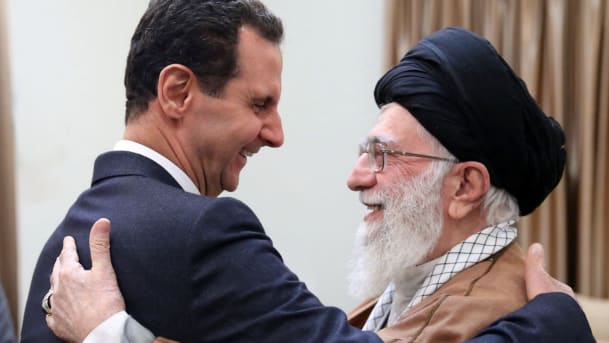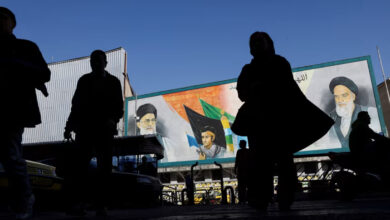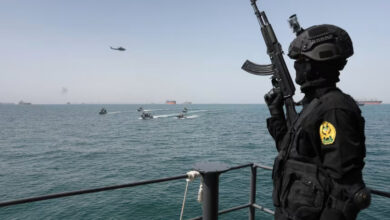
Today, Syria is experiencing a serious impasse, where the country is living in a state of “no war, no peace”. There are no clear battles on the ground, nor is there the peace that would allow the reconstruction process to begin. Every insight into the situation in Syria and each path in the maze to finding a solution lead to the same complex problem and a huge obstacle: Iran and its influence in Syria.
Syrian-Iranian relations are among the most closely studied and observed issues. They have been approached from various directions by many major think tanks in the world, firstly because of the impact they have on many issues in the Middle East and secondly due to their unusual nature. These relations were originally formed to be a trump card in the hands of both countries in their effect on the balance of power in the region and they continue to exist due to the geopolitical situation in the Middle East. More surprisingly, these relations in their current form have a negative impact on all the actors, even Damascus and Tehran themselves, yet all attempts to break them, especially by the West, fail.
This failure is due to the fact that the West deals with both countries in the same manner, regardless of the great differences between the case of Syria and the case of Iran. It can even be said that the policies adopted by the West in dealing with Syria, and the isolation and pressure applied to it, resulted in the strengthening of the ties between Syria and Iran. More seriously, it allowed the scale to tilt in favor of Tehran at the expense of Damascus, especially since the Syrian crisis began in early 2011.
Syria’s relations with the West have always been tense, with occasional periods of agreement. For example, it was difficult for the Syrian leadership to mend the tense relationship with France, the former mandate state, even after Syria’s independence in 1946. Even today, most Syrians cannot forgive the European Mandate powers for cutting off large areas from northern Syria, and later the “Sanjak of Alexandretta” district and giving it to Turkey to buy its loyalty against the growing threat of Germany at the time.
As for the United States, its relations with Syria have always been tense and troubled since the latter’s independence because the Soviet-American struggle for influence and oil in the Middle East spilled over into Syria. Moreover, the massive American support for Israel has only deepened the rift between Washington and Damascus, especially after it led to Syria’s defeat in the June 1967 war and the loss of the strategically important Golan Heights.
In their attempt to change Damascus’ position, American administrations have always resorted to pressure. Economic sanctions are not new, as the first sanctions Washington imposed on Syria date back to 1979 when Damascus was accused of “supporting terrorism”, which meant the Palestinian organizations in Syria and Lebanon.
Those sanctions caused a significant deterioration in the Syrian economy and pushed it to close-in on itself in an attempt to achieve self-sufficiency. They also pushed the Syrian regime more into the arms of the Soviet Union, America’s biggest enemy at the time. Today, the scenario is not much different!
Relations improved temporarily in the 1990s after Syria joined the United States’ coalition to liberate Kuwait after the Iraqi invasion in the summer of 1990. However, President Bill Clinton failed to exploit this rapprochement to push Syria to sign a peace agreement with Israel, despite the peace process that was underway at the time. These warmer relations soon ended after the 9/11 attacks, which led to a radical change in US policy in the Middle East.
In 2003, Syria opposed the war on Iraq in the UN Security Council, after which Damascus found itself part of the “axis of evil” and under unprecedented American pressure. George W. Bush’s administration imposed sanctions against Damascus and played an important role in passing many international resolutions aimed at changing Syria’s behavior in the region, the most significant of which was security Council Resolution No. / 1559 / which mandates the withdrawal of “all foreign forces” from Lebanon. Moreover, Damascus fell into greater isolation after it was accused of assassinating former Lebanese Prime Minister Rafic Hariri in February 2005.
This isolation continued until May 21, 2008, when indirect talks between Syria and Israel in Turkey were announced. These talks angered Iran and a senior advisor to Ali Khamenei warned Damascus of “the consequences of peace on its relations with Tehran”. This was not the first disagreement between the two “allies”.
They had disagreed before over Iraq after the American invasion. Syria was not satisfied with the sectarian government that Iran wanted in Iraq and the Syrian army was not comfortable with the way Iran gained a foothold in southern Lebanon. However, the isolation and pressure imposed on Syria after the events of 2011, pushed it into a rapprochement with Iran, otherwise, Syria —which has suffered from political Islam and its attempts to impose political and social agendas on the country since the 1960s — would not have allied itself with its supporters in Iran, or previously in Turkey.
The important question here is: “Why has the West continued to pursue the same foreign policy toward Syria for decades, while expecting different results?” It should be noted that changing the approach has a logical and rational justification! Contrary to what many believe, the Syrian-Iranian alliance is not unbreakable as it has no solid foundations and only came about as a result of a fait accompli created by the dynamics of events in the Middle East.
Syria has always portrayed itself as an Arab-nationalist state, while Iranian politicians spare no opportunities to indicate that Iran is a Persian state. In terms of the socio-political system, the Syrian regime, and Syrian society in general, tend to be secular, in contrast to the theocratic regime in Iran that raises the slogan of “revolutionary” political Islam and aims to spread its own version of Islam as part of its tireless effort to impose cultural hegemony over the region.
Moreover, the vast majority of Iranians are Shiites, while most Syrians are Sunnis, and this is a political reality rather than an opinion.
In this context, the prevailing misconception that Iran is welcome in Syria needs to be corrected. In fact, Syrians are not satisfied that their country is described as “the 35th province of Iran” or that “if it were not for Tehran, Damascus would have fallen” or any of the other provocative statements by Iranian officials; nor are they satisfied with the unfair conditions attached to Iranian credit lines which continue to burden the Syrian economy with their high costs.
Officially, the Syrian elite is still divided on Iran. Some believe that it is trying to create a state of parallel security which may turn into a “state within a state” as is the case in Lebanon.
On the military front, however, the secular and multi-ethnic nature of the Syrian army is very different from that of the Iranian forces which use religious ideology to motivate their soldiers. From its perspective, the Syrian army is defending a country, while the Iranian militias are defending “holy shrines”. This produces a state of mutual mistrust that creates a structural defect in the foundations of this alliance.
These and many other factors make the “Syrian-Iranian alliance” a burden on Damascus, which is aware of the risks and dangers of its relationship with Iran at political, military and cultural levels. This makes reaching a deal possible, and even something to be expected.
It should be realized that making deals in politics requires concessions from all parties according to their interests. Although the issue of Syria is set aside at present, this situation should not continue because wasting time means an increase in the Iranian military presence in many locations in Syria and a greater influence of Iranian advisers in the affairs of the Syrian state, not to mention the continuing severe economic crisis in Syria, the deterioration of the conditions of Syrian people and the loss of their livelihoods.
In parallel, breaking this alliance will deal a fatal blow to the Iranian project to dominate the region and perhaps to the whole of the Iranian regime as well. Changing Syria’s camp would mean that all the roads from Iran to Hezbollah in Lebanon will be completely severed and thus Iran will lose its most important proxy in the region. The influence of this move will also extend to the Palestinian forces obstructing the peace process as well as to the Shiite militias in Iraq.
Finally, I believe it is necessary to emphasize that dealing with Syria should be different from dealing with Iran. Syria does not have an expansionist project in the region, and should not be punished for opposing Israel which still occupies Syrian territories and Damascus has not yet found any just proposals to motivate it to choose peace.
In addition, sanctions on Syria for its previous opposition to the American invasion of Iraq should be lifted. Syria was worried that chaos does not recognize borders and indeed, this is what actually happened. Chaos has moved into Syria and has brought with it one of the worst terrorist organizations in human history: “ISIS”.
After ten years of bloodshed in Syria and debates at diplomatic levels, there is no way out other than by making a major deal, without which the situation will enter a dark tunnel, with negative effects that will not stop at the borders of the Middle East. It seems clear that Damascus has chosen to use rapprochement with Tehran as a card in its hand.
Today, the time has come to play this card. On the other hand, in order to build true peace in the region, Syria should be brought out from its crisis and isolation and back into its surroundings and its true role. After all, as Former Secretary of State Henry Kissinger said “in the Middle East, you can’t make peace without Syria”.




